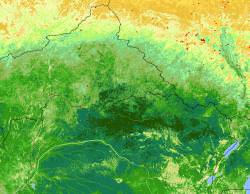Written by Fraser Cain

Take a nice deep breath, fill your lungs with oxygen. You can thank the plants for that. Scientists had originally found that oxygen showed up in the Earth's atmosphere around 2.3-2.4 billion years ago; in a period called the "Great Oxidation Event". But there's new evidence, dug out of a rock in Australia, that puts that first date even earlier by 50-100 million years.
Researchers gathered samples from a region of Western Australia called Hamersley Basin. In one part of the kilometre-long rock sample, they found an ancient rock that shows how the atmosphere was switching over to the oxygen-rich air we enjoy today. Their research appeared in the September 28th issue of the journal Science.
According to one of the researchers, Ariel Anbar, from Arizona State University, "we seem to have captured a piece of time before the Great Oxidation Event during which the amount of oxygen was actually changing – caught in the act, as it were."
During the summer of 2004, researchers bored a 1 km long sample of rock out of Hamersley Basin in Western Australia, a region famous for keeping a geologic history of the Earth. Because the sample was so deep underground, it had been untouched for billions of years. The researchers sliced the sample and kept half in Australia, and took the other half back to the US.
They began to analyze ancient portions of the sample, looking for the trace metals molybdenum, rhenium and uranium. The amount of these metals found in ocean deposits depends on the amount of oxygen in the atmosphere. They found a region of time, ahead of the Great Oxidizing Event by about 100 million years, where oxygen was forming in the atmosphere.
It's thought that life started learning how to produce oxygen then, but everything that made was soaked up by geologic processes. It took 100 million years for the life to overcome those effects and start seeding the atmosphere with oxygen.
Of course, this discovery will help astronomers search for life on other planets in the galaxy. They will eventually be able to measure the oxygen content precisely, and identify what stage of evolution life on the distant planet could be at. If none have undergone a similar Great Oxidation Event, it tells us how rare life might be in the Universe.
Original Source: ASU News Release



No comments:
Post a Comment